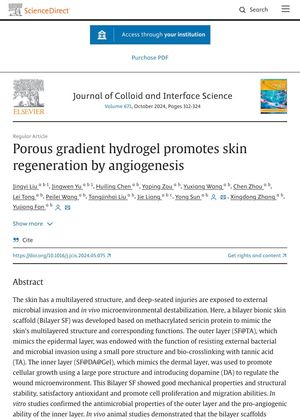Porous Gradient Hydrogel Promotes Skin Regeneration by Angiogenesis
May 2024
in “
Journal of colloid and interface science
”
bilayer bionic skin scaffold methacrylated sericin protein tannic acid dopamine antioxidant capabilities cell proliferation cell migration antimicrobial properties pro-angiogenic properties collagen deposition neovascularization hair follicle formation bionic skin scaffold sericin protein antioxidants cell growth new blood vessels hair growth

TLDR The hydrogel helps skin heal by encouraging new blood vessel growth.
The study successfully developed a bilayer bionic skin scaffold using methacrylated silk fibroin (MASF) through photo-crosslinking. This scaffold mimics the dermis and epidermis, promoting skin regeneration with good mechanical properties, adhesion, biocompatibility, and blood compatibility. The inner layer, composed of MASF, GelMA, and DMA, supports blood vessel and hair follicle formation and regulates the wound microenvironment. The outer layer, made of MASF and tannic acid (TA), provides antimicrobial and antioxidant properties. In vivo tests on BALB/c mice demonstrated effective wound healing, comparable to commercial hemostatic sponges.


